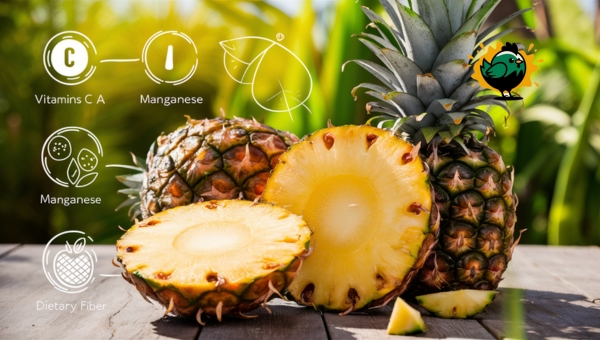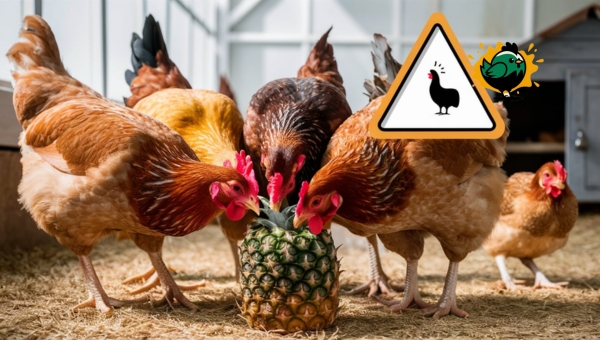Can Chickens Eat Pineapple? Surprising Benefits Unvealed

A warm summer day, and you find yourself wondering if the sweet, juicy pineapple on your kitchen counter can be shared with your feathered friends. The thought of chickens pecking at tropical treats might seem unusual, yet it sparks curiosity.
Can chickens eat pineapple? Well, we’ve got some answers for you. Pineapple, with its vibrant flavor and essential nutrients, seems like a fun snack option. But before tossing them a slice, it’s crucial to dive into the details.
Understanding what this fruit offers and any potential risks can ensure your chickens stay healthy and happy. Let’s explore this tropical delight further!
Can Chickens Eat Pineapple?
Chickens can indeed eat pineapple, and it can be a refreshing treat for them. Pineapple is rich in vitamins like vitamin C and B6, which can boost a chicken’s immune system and overall health. Moreover, it contains essential minerals such as manganese and copper, beneficial for bone health and metabolism.

However, it’s crucial to note the high sugar content in pineapple. Excessive sugar may lead to weight gain and digestive issues in chickens. Therefore, pineapple should be offered in moderation.
When feeding pineapple, remove the tough skin and core, as these parts can be difficult for chickens to digest. A few small, chopped pieces are enough as an occasional treat. By doing so, you can provide your chickens with a nutritious and delightful snack without compromising their health.
Nutritional Value of Pineapple
When considering treats for chickens, it’s important to understand the nutritional content. Pineapple is a tropical fruit with a lot to offer. Let’s delve deeper into the essential vitamins and minerals it contains, as well as its sugar content, to make informed decisions about what our feathered friends consume.

Vitamins and Minerals
Pineapple is packed with essential nutrients that can be beneficial for chickens:
- Vitamin C: While chickens produce their own vitamin C, an extra boost from pineapple can support their immune system.
- Manganese: This mineral is crucial for bone development and metabolism. Pineapple is a good source of manganese, which can aid in maintaining healthy bones in chickens.
- Vitamin B6: Supports metabolic processes and helps in producing antibodies.
- Dietary Fiber: Aids in digestion, ensuring that chickens maintain a healthy digestive tract.
These nutrients make pineapple a potentially beneficial treat, provided it’s offered in moderation.
Sugar Content
Pineapple naturally contains sugars, which can be a concern when feeding chickens:
- Natural Sugars: Pineapples are high in natural sugars, which can lead to weight gain if consumed in large quantities.
- Moderation is Key: Due to the sugar content, it’s crucial to limit the amount of pineapple given to chickens to avoid any health issues such as obesity or digestive problems.
By balancing the nutritional benefits with the sugar content, pineapple can be a healthy addition to a chicken’s diet when given sparingly.
Benefits of Pineapple for Chickens
Pineapple can be a delightful addition to a chicken’s diet due to its many benefits.

Here’s why:
- Vitamins and Minerals: Pineapple is rich in vitamin C, which can support the immune system in chickens, helping them fight off illnesses. It also contains essential minerals like manganese, which aids in bone development and metabolism.
- Antioxidants: This fruit is packed with antioxidants that help protect chickens from oxidative stress, promoting overall health and vitality.
- Digestive Health: Pineapple contains bromelain, an enzyme that can assist in digestion, ensuring chickens better absorb nutrients from their feed.
- Hydration: With its high water content, pineapple can help keep chickens hydrated, especially during hot weather.
By offering pineapple in moderation, these benefits can enhance the well-being of your flock.
Also Read: Can Chickens Eat Spinach Safely? Find Out Now!
Potential Risks of Feeding Pineapple to Chickens
When considering adding pineapple to your chicken’s diet, it’s crucial to be aware of potential risks. Pineapple, while nutritious, may pose some challenges for chickens if not fed properly. Understanding these risks ensures the health and well-being of your flock.

Health Concerns
Feeding pineapple to chickens can lead to certain health concerns if not monitored:
- High Sugar Content: Pineapple contains a significant amount of sugar, which can lead to weight gain and affect a chicken’s overall health.
- Digestive Issues: The fibrous texture of pineapple might be difficult for chickens to process, potentially causing digestive upset.
- Acidity Levels: Pineapple is quite acidic, which can irritate a chicken’s digestive tract if consumed in large quantities.
Safe Feeding Practices
To safely incorporate pineapple into your chickens’ diet, consider the following practices:
- Moderation is Key: Offer pineapple as an occasional treat rather than a regular part of their diet.
- Cut into Small Pieces: Ensure that the pineapple is sliced into small, manageable pieces to prevent choking hazards.
- Remove the Core and Skin: Always remove the tough core and outer skin, as they can be hard for chickens to digest.
By following these guidelines, you can safely offer pineapple to your chickens while minimizing potential risks.
How to Prepare Pineapple for Chickens?
Preparing pineapple for chickens requires some careful steps to ensure it is safe and nutritious. When introducing this tropical fruit to their diet, it’s vital to focus on how it’s served and the right portion sizes. Let’s dive into the details of serving suggestions and appropriate amounts to offer your feathered friends.
Serving Suggestions
When serving pineapple to chickens, it’s important to make it easy for them to eat and digest.
Here are some detailed steps to follow:
- Remove the Skin and Core: Begin by peeling the pineapple. The tough outer skin and core are not suitable for chickens and can be difficult for them to digest.
- Cut into Small Pieces: Slice the pineapple into small, bite-sized pieces. Chickens peck their food, so smaller chunks are easier for them to handle and reduce the risk of choking.
- Offer Fresh and Ripe Pineapple: Ensure that the pineapple is fresh and ripe. Overripe or under-ripe pineapple may not be appealing to chickens and can affect their digestion.
- Mix with Other Foods: To balance their diet, you can mix the pineapple pieces with other fruits or their regular feed. This not only makes it more enticing but also ensures they get a variety of nutrients.
Portion Sizes
Feeding chickens the right portion of pineapple is crucial to avoid any health issues.
Consider these guidelines:
- Moderation is Key: Pineapple should be treated as a treat, not a staple. A small amount, such as a few pieces per chicken, once or twice a week, is sufficient.
- Adjust According to Flock Size: The quantity should be adjusted based on the number of chickens. For a small flock, a quarter of a pineapple is typically enough.
- Observe Their Response: Start with smaller portions when introducing pineapple for the first time. Observe how the chickens react and adjust portions accordingly to ensure they don’t consume too much sugar.
Also Read: Can Chickens Eat Pumpkin? Find Out the Benefits and Tips!
Alternative Treats for Chickens
When considering treats for your chickens, variety is key to keeping them healthy and happy. While pineapple is a tasty option, there are many other treats that can be just as beneficial.
Here are some alternatives you can explore:
- Vegetables: Carrots, spinach, and kale are great choices. They are rich in vitamins and provide essential nutrients. Chickens enjoy pecking at leafy greens, which can be hung in their coop for entertainment.
- Fruits: Apples, berries, and melons make excellent treats. Ensure that seeds and pits are removed, as they can be harmful. These fruits offer a sweet treat while still being nutritious.
- Grains: Oats and barley are perfect for chickens. They are easy to digest and can be mixed with regular feed to add variety to the diet.
- Protein Sources: Consider offering mealworms or cooked eggs. These are high in protein, which is crucial for egg production and overall health. Mealworms can be scattered to encourage natural foraging behavior.
- Herbs: Fresh herbs like basil and parsley can be a delightful addition. They have natural health benefits and can boost your chickens’ immune systems.
Always remember to introduce new treats gradually and in moderation to avoid digestive issues. Providing a balanced variety of treats ensures that your chickens receive a wide range of nutrients while keeping their diet interesting.
Conclusion
It’s important to note that feeding pineapple to chickens can be both beneficial and challenging. Pineapples offer essential vitamins and minerals that can support a chicken’s health. However, considering their sugar content and potential health concerns is vital.
If you choose to introduce pineapple into your chickens’ diet, ensure it is done safely and in moderation. Focusing on appropriate portion sizes and safe feeding practices will help maintain their well-being.
For more insights and tips on caring for your flock, check out our other informative articles. Dive into our blog to discover a wealth of knowledge about chicken care and nutrition!
